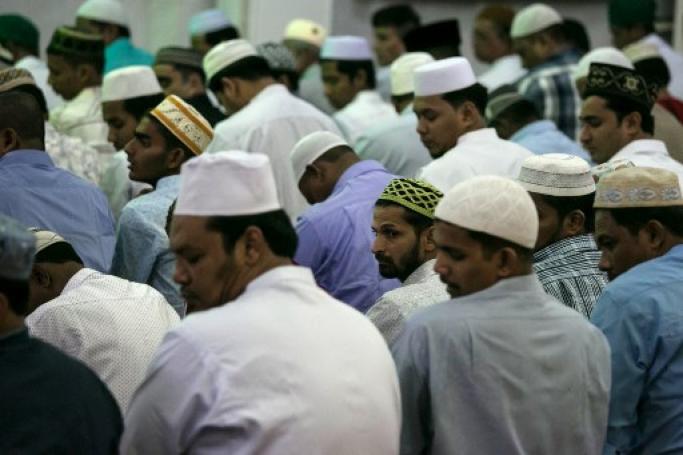Equal religious rights are an impossible dream for Ko Thar Nge.
The 30-year-old Muslim of Karen, Burmese and Indian extraction says that from an early age he experienced discrimination.
In the Buddhist-majority Golden Land, members of minorities like Ko Thar Nge face difficulties.
“Actually, the discrimination is caused by those who exploit extreme nationalism and a religious agenda in politics. Thus, we are currently speaking out seriously about religious discrimination and equal rights.
Actually, this issue will still be a weapon for cruel politicians in our country, which have an unbalanced living standards and troubled education system,” the Yangon resident tells Mizzima.
Ko Thar Nge says he longs for equal rights. After all, the Myanmar Constitution guarantees every citizen “the right to freely profess and practice religion subject to public order, morality, or health and to the other provisions of this Constitution.” The law prohibits speech or acts insulting or defaming any religion or religious belief.
But tell that to the minorities, particularly Muslims, who experience problems in Myanmar.
Since at an early age, Ko Thar Nge was used to being called the inappropriate word “Kalar” at school.
The word “Kalar” is a racial slur used to discriminate against Muslims and those of South Asian descent.
Even in classes, some of his teachers did not pay respect to him because of his skin colour and race, he says, noting that they did this in front of other students.
As a young child he suffered mental injury, he says. Some of his classmates ridiculed him for abstaining from praying with his hands together during Buddhist chanting sessions in high school. His school friends looked askance at him.
Dealing with officialdom was not easy. When he was old enough, he struggled to get a national ID card because he is a Muslim, a typical complaint.
“When we were young, youths used to have arguments about religion. Usually, a debate about religious beliefs would be a normal thing in other countries. However, in my country, due to the widespread
misleading and triggering information about our religion (Islam) systematically by some powerful people, we are facing the consequences. For instance, they alleged that if they bought things from us (Muslims), the Muslims would use the money for spreading their religion (Islam). They wrongly accused mosques of giving some Muslims money to marry Buddhist girls,” said Ko Thar Nge.
“These consequences affect our daily lives as well, and sometimes we lose friends because of it,” he said.
The International Commission of Jurists (ICJ) says Article 34 of the 2008 Constitution of Myanmar recognizes the freedom of religion or belief, and grants citizens the “right to freely profess and practise
religion ... subject to public order, morality or health and to the other provisions of this Constitution.”
Article 364 further states that, “any act which is intended or is likely to promote feelings of hatred, enmity or discord between racial or religious communities or sects is contrary to this Constitution.”
However, Article 361 of the Constitution recognizes the “special position of Buddhism.”
In contemporary public discourse, Buddhism has been closely associated with the State in the Burman-dominated centre of the country, the ICJ reports. Public messaging by Buddhist nationalist groups often
carries a strong anti-Muslim message. This has included depictions of Islam in opposition to Burmese values, inherently violent and a threat to Buddhism.
Buddhist nationalist groups have also advocated or condoned violence towards Muslims. The growing popularity of these movements has made Muslims, Christians and to a lesser extent, other religious minorities, feel increasingly vulnerable, the ICJ reports.
Ko Thar Nge says that while he treats everyone equally, regardless of skin colour and religion, society can be hard on minorities. It is clear the Myanmar military regimes over the years have misused religion in politics and that there are widespread misconceptions about the religions of minorities.
He says he respectfully learns about others people’s religions, but he has found he had had to remove some “extremely religious friends” from his life.
“At present, I personally avoid those people and societies who are likely to discriminate. I mean that they are the people who discriminate against not only people of my religion but also people of any other religion or belief. I eliminated some extremists from my friend list on social media as well. Those who disrespect religions and beliefs will not be compatible with anyone.”
The situation in Myanmar at the moment is particularly tense since the military junta took over last year, with all the unlawful arrests and killings.
Ko Thar Nge brings up the 2017 genocide committed against the Muslim Rohingya, noting he does not blame people of any religion for being silent on this issue.
“While talking about the Rohingya issue, we also need to speak out about those who were massacred by the Myanmar military over generations in our country. In addition, ethnic minority groups were killed in every region. The crimes were committed by the killers,” said Ko Thar Nge.
“In this military-dominated country, not only religious minorities but also Buddhists are killed inhumanely (by the military). The crime is committed by the same group (the Myanmar army),” he said.
That said, he notes that there are Buddhist whistleblowers who have spoken out over the Rohingya issue.
As Ko Thar Nge points out, everybody needs to speak out against unjust killings, whatever their religion.












